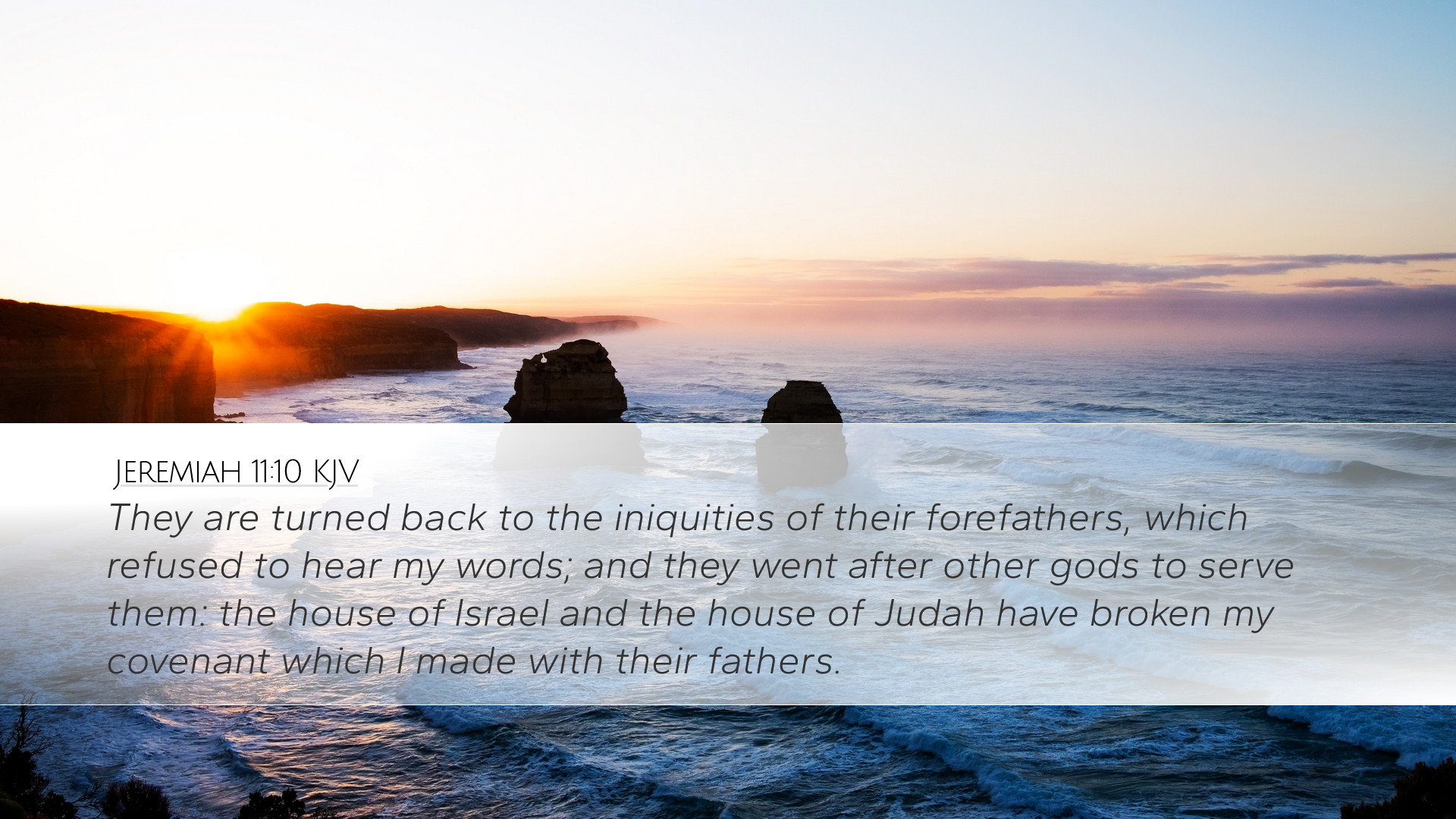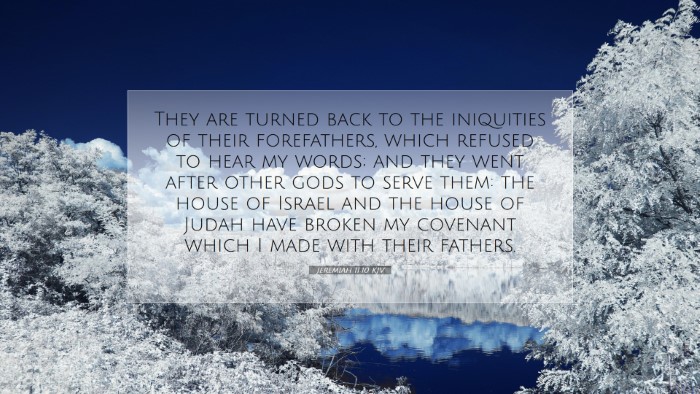Commentary on Jeremiah 11:10
Jeremiah 11:10 states, "They have turned back to the iniquities of their forefathers, who refused to hear My words; and they have gone after other gods to serve them. The house of Israel and the house of Judah have broken My covenant which I made with their fathers."
Contextual Background
This verse falls within a broader prophetic discourse where God, through Jeremiah, addresses the unfaithfulness of Israel and Judah. The historical context includes their repeated disobedience and idolatry, which prompted God to make known His displeasure and the consequences of such actions.
Exegetical Insights
Jeremiah is a prophet deeply concerned with the spiritual and moral decay of his nation. He communicates God’s message to a people who have consistently ignored divine warnings.
Turned Back
The phrase "turned back" indicates a deliberate choice to revert to previous sinful behaviors. This act is not merely a lapse; it is a conscious rejection of God’s guidance.
Iniquities of Their Forefathers
Commentators like Matthew Henry emphasize the generational aspect of sinning. The iniquities of the forefathers reflect a systemic issue, where past disobediences influence current behaviors. Here, Israel and Judah are culpable not just for their own actions, but also for perpetuating the sins of their ancestors.
Refusal to Hear
God's lament "who refused to hear My words" signifies that the root of their rebellion lies in a refusal to engage with God's revelation. Albert Barnes notes that true hearing involves obedience, thus highlighting the people's failure not only to listen but also to act upon the weighty truths God has shared with them.
Other Gods
The pursuit of other gods signifies a fundamental breach of contract as it pertains to God’s covenant with Israel. Adam Clarke expands on this, noting that the lure of idolatry represents a profound betrayal of the commitment to Yahweh, who alone is worthy of worship.
Theological Implications
This verse speaks to the issues of covenant fidelity and the seriousness of idolatry. It calls into question the nature of commitment to God and the consequences that arise when that commitment is broken.
Critical Reflection
Asstudents of the Bible, it is important to reflect on the implications of this verse. How do contemporary believers engage with the covenant relationship today? What idols might still distract the heart from pure devotion to God?
Covenant Responsibility
Each generation inherits the responsibility to uphold God's covenant. The text warns of the cycles of sin that can ensnare communities and individuals alike. Matthew Henry posits that recognizing failures of past generations should incentivize a commitment to righteousness in the present.
The Call to Repentance
This passage serves as a call to repentance, urging the people to abandon their sinful ways and return to God. Albert Barnes encourages the faithful to reinforce their dedication not solely through rituals but through genuine transformation of heart and mind.
Practical Application
Jeremiah 11:10 challenges pastors and theologians to consider how teachings from the Old Testament shape understanding of sin and disobedience in today's context.
Lessons for Leadership
Pastors can draw from Jeremiah's experiences to understand the importance of prophetic preaching that highlights accountability and fidelity to God’s commands. The church today faces similar temptations and must guard against complacency and distractions that lead to spiritual apathy.
Educational Insights
For students and scholars, this verse provides fertile ground for academic exploration, particularly in understanding the prophetic literature's interplay with Israel's social and spiritual dynamics. The themes of sin, rebellion, and divine covenant remain relevant for historical theology.
Intergenerational Dialogue
Engaging in intergenerational conversations about faithfulness can also be a practical step forward. Understanding the historical consequences of forsaking God can encourage newer generations to hold tightly to their faith and appreciate the covenantal relationship they share with God.
Conclusion
In summary, Jeremiah 11:10 serves not merely as a historical critique but as a timeless reminder of the necessity to hear and obey God’s voice. The collective societal tendencies to revert to sin, failure to heed divine warnings, and the allure of idolatry are as present today as they were in ancient Israel. As religious leaders, scholars, and believers, it is our duty to uphold the covenant and stimulate a journey back to true obedience and reverence for God.


